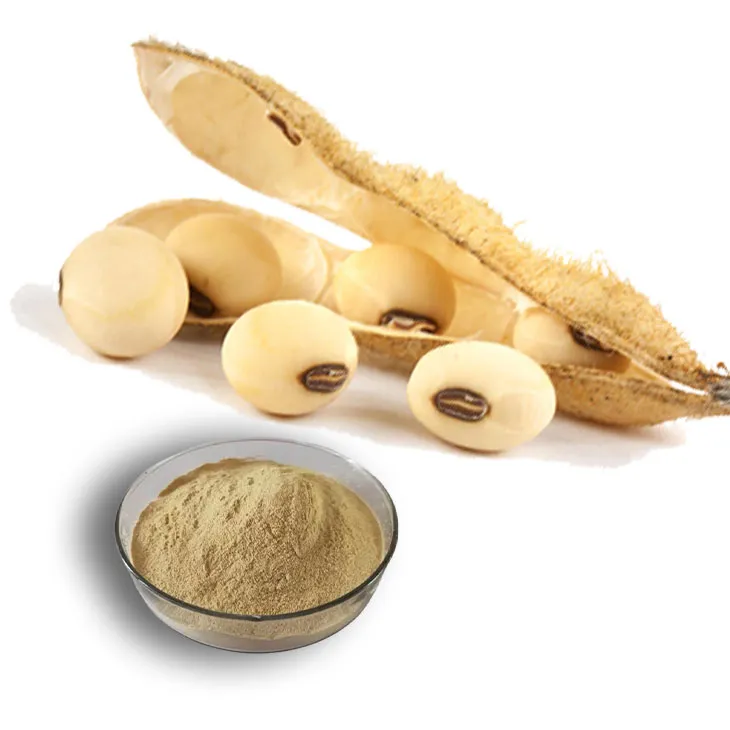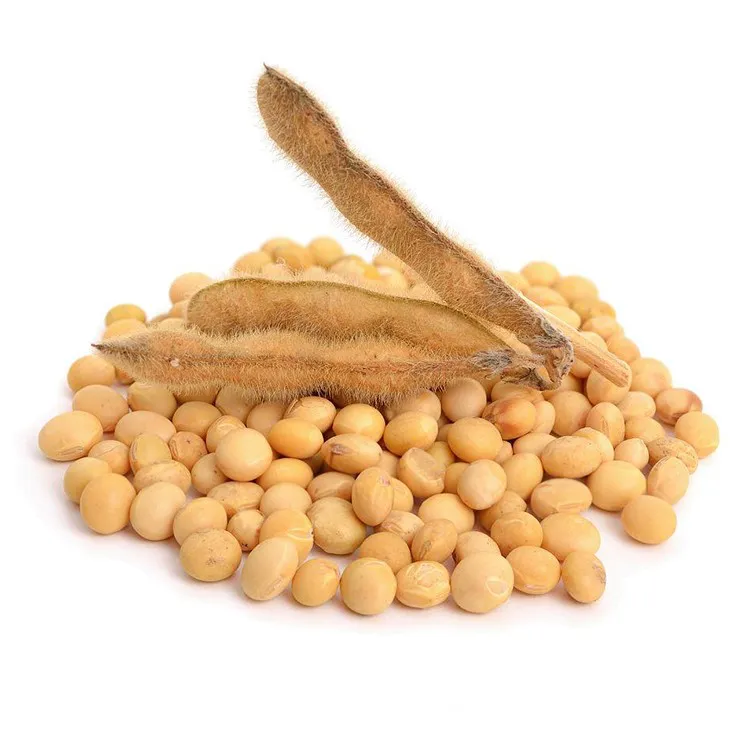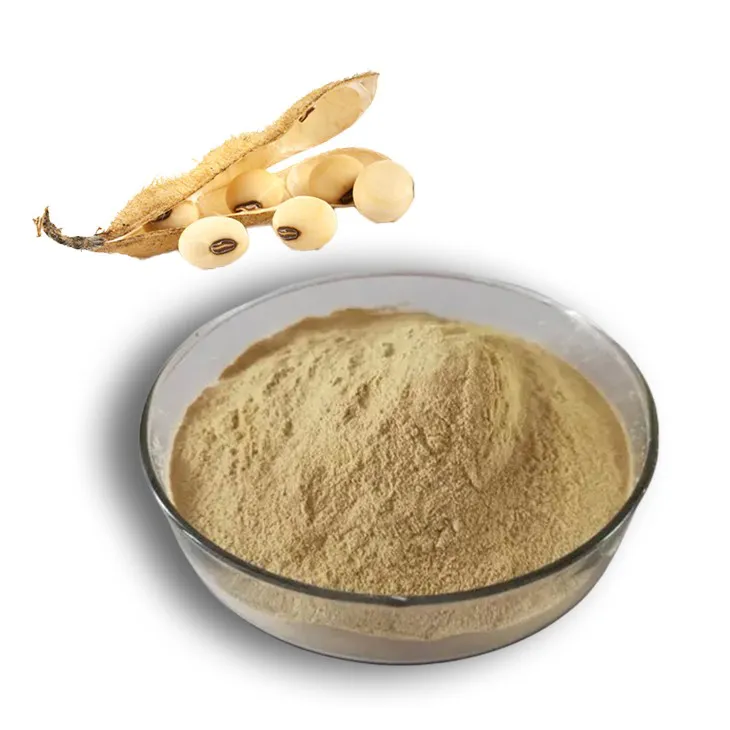- 0086-571-85302990
- sales@greenskybio.com
Four major benefits of soy extracts for women of all ages.
2024-11-12

Benefit 1: Hormonal Balance
Soy Extracts play a significant role in hormonal balance for women. Isoflavones, which are abundant in Soy Extracts, have a structure similar to that of the female hormone estrogen. This similarity allows them to interact with estrogen receptors in the body.
Puberty
During puberty, a girl's body undergoes numerous hormonal changes. The hormonal system is in a state of flux as the ovaries start to produce more estrogen. For some girls, this transition can be accompanied by symptoms such as irregular menstrual cycles or mood swings. Soy Extracts can potentially help in modulating these hormonal changes. The isoflavones in soy can bind to estrogen receptors, providing a mild estrogen - like effect. This can help in regulating the menstrual cycle and reducing the severity of mood swings. For example, a study has shown that girls who consume a diet rich in soy - based products tend to have more regular menstrual cycles compared to those who do not.
Reproductive Years
In the reproductive years, hormonal balance is crucial for fertility and overall well - being. Women may experience hormonal imbalances due to various factors such as stress, diet, or underlying health conditions. Soy extracts can be a natural way to support hormonal balance. They can help in maintaining the right levels of estrogen and progesterone. For instance, isoflavones may assist in reducing the symptoms of premenstrual syndrome (PMS). PMS is often associated with hormonal fluctuations, and the estrogen - like activity of soy isoflavones can help in alleviating symptoms such as breast tenderness, bloating, and irritability.
Menopause
Menopause is a significant milestone in a woman's life, marked by a decline in estrogen production. This decline can lead to a host of symptoms, including hot flashes, night sweats, and bone loss. Soy extracts can act as a natural alternative to hormone replacement therapy (HRT). The isoflavones in soy can mimic the action of estrogen in the body, helping to relieve menopausal symptoms. For example, research has indicated that women who consume soy extracts regularly experience a reduction in the frequency and severity of hot flashes. Moreover, soy isoflavones may also have a positive impact on bone health during menopause by reducing bone resorption, which is the process by which bone is broken down.

Benefit 2: Skin Health
The health of the skin is of great concern to women of all ages. Soy extracts offer several benefits for skin health.
Anti - Aging Properties
One of the main reasons for skin aging is oxidative stress caused by free radicals. Soy extracts are rich in antioxidants such as vitamin E and phenolic compounds. These antioxidants can neutralize free radicals, thereby reducing oxidative damage to the skin. This can help in preventing the appearance of wrinkles, fine lines, and age spots. For example, a topical application of soy - based creams has been shown to improve the skin's elasticity and reduce the signs of aging. In addition, the isoflavones in soy can also stimulate the production of collagen in the skin. Collagen is a protein that gives the skin its firmness and elasticity. As women age, the production of collagen decreases, leading to sagging skin. By promoting collagen production, soy extracts can help in maintaining a youthful appearance.
Moisturizing and Hydrating
Soy extracts have moisturizing properties that can benefit the skin. They can help in retaining moisture in the skin, keeping it hydrated. This is especially important for women with dry skin. The lipids present in soy extracts can form a protective barrier on the skin's surface, preventing water loss. This can result in softer, smoother skin. Moreover, the amino acids in soy can also contribute to the skin's hydration by improving its water - holding capacity.
Acne and Skin Inflammation
Soy extracts may also be beneficial for treating acne and skin inflammation. The anti - inflammatory properties of soy isoflavones can help in reducing redness and swelling associated with acne. They can also regulate sebum production in the skin. Sebum is an oily substance produced by the sebaceous glands, and excessive sebum production can clog pores and lead to acne breakouts. By regulating sebum production, soy extracts can help in preventing acne. Additionally, soy extracts can also soothe irritated skin, making it useful for treating skin conditions such as eczema and psoriasis.

Benefit 3: Heart Health
Heart disease is a major concern for women's health. Soy extracts can contribute to better heart health in several ways.
Lowering Cholesterol Levels
High cholesterol levels are a risk factor for heart disease. Soy extracts can help in reducing cholesterol levels, particularly low - density lipoprotein (LDL) cholesterol, which is often referred to as "bad" cholesterol. The isoflavones in soy can interfere with the absorption of cholesterol in the intestine. They can also increase the excretion of cholesterol from the body. For example, a diet rich in soy - based foods has been associated with a significant reduction in LDL cholesterol levels. This can help in reducing the risk of developing heart disease.
Blood Pressure Regulation
High blood pressure is another risk factor for heart disease. Soy extracts may have a beneficial effect on blood pressure regulation. Some studies suggest that the peptides present in soy can act as vasodilators, which means they can relax the blood vessels, allowing for better blood flow. By improving blood flow and reducing blood pressure, soy extracts can contribute to heart health. However, more research is needed to fully understand the mechanisms involved in blood pressure regulation by soy extracts.
Anti - Inflammatory Effects on the Heart
Inflammation in the heart and blood vessels can also contribute to the development of heart disease. Soy extracts, with their anti - inflammatory properties, can help in reducing this inflammation. The isoflavones in soy can inhibit the production of inflammatory cytokines in the body. These cytokines are molecules that play a role in the inflammatory response. By reducing inflammation in the heart and blood vessels, soy extracts can help in preventing heart disease and improving overall heart health.

Benefit 4: Reducing the Risk of Certain Cancers
Soy extracts may also play a role in reducing the risk of certain cancers in women.
Breast Cancer
Breast cancer is one of the most common cancers in women. The relationship between soy consumption and breast cancer risk is complex. Some studies suggest that the isoflavones in soy may have a protective effect against breast cancer. The estrogen - like activity of isoflavones can interact with estrogen receptors in breast cells. In pre - menopausal women, soy isoflavones may act as weak estrogens, competing with the body's own estrogen for receptor binding. This can potentially reduce the proliferative effects of estrogen on breast cells, which may be beneficial in reducing the risk of breast cancer. However, in post - menopausal women, the situation is more complicated, as the role of soy isoflavones may depend on factors such as the type of breast cancer and the individual's hormonal status. Overall, more research is needed to fully understand the impact of soy extracts on breast cancer risk.
Endometrial Cancer
Endometrial cancer is another cancer that affects women. Estrogen plays a role in the development of endometrial cancer, as excessive estrogen exposure can stimulate the growth of the endometrium. Soy isoflavones, with their estrogen - like activity, may help in reducing the risk of endometrial cancer. By binding to estrogen receptors in the endometrium, isoflavones can modulate the effects of estrogen, potentially reducing the risk of abnormal cell growth. However, as with breast cancer, more research is needed to clarify the exact role of soy extracts in preventing endometrial cancer.
Ovarian Cancer
Ovarian cancer is a serious and often difficult - to - detect cancer in women. While the evidence is still limited, some studies suggest that soy extracts may have a potential role in reducing the risk of ovarian cancer. The mechanisms involved may be related to the hormonal and anti - inflammatory effects of soy isoflavones. For example, the anti - inflammatory properties of isoflavones may help in reducing chronic inflammation in the ovaries, which is thought to be a risk factor for ovarian cancer. However, further research is required to confirm these findings.
FAQ:
What are the four major benefits of soy extracts for women?
The four major benefits often include helping with hormonal balance throughout different life stages, being beneficial for skin health, reducing the risk of certain diseases, and providing other potential health - promoting effects that are especially relevant for women from puberty to menopause.
How does soy extract help with hormonal balance in women?
Soy contains phytoestrogens which can mimic the action of estrogen in the body to some extent. During puberty, it may help regulate the development of secondary sexual characteristics related to hormonal changes. In the pre - menopausal years, it can assist in maintaining a more stable hormonal environment. And during menopause, when a woman's natural estrogen levels decline, soy extracts may help relieve some of the symptoms associated with hormonal imbalance such as hot flashes.
Can soy extracts really improve skin health in women?
Yes, they can. Soy extracts are rich in antioxidants. These antioxidants help fight free radicals in the body that can damage skin cells. By reducing oxidative stress, soy extracts may contribute to a more youthful - looking skin, improve skin elasticity, and may also help with some skin conditions like acne or dry skin.
What types of diseases can soy extracts reduce the risk of in women?
Soy extracts may help reduce the risk of certain cancers, such as breast cancer. The phytoestrogens in soy may interact with the body's hormonal systems in a way that is protective against cancer development. Also, it may be beneficial for heart health, potentially reducing the risk of heart diseases in women by improving lipid profiles, for example, by reducing LDL (bad) cholesterol levels.
Are there any side effects of soy extracts for women?
For most women, soy extracts are safe when consumed in normal amounts. However, some women may experience mild digestive issues like bloating or gas. In addition, there is some concern that in women with a history of estrogen - sensitive cancers, high - dose soy extract consumption may potentially have adverse effects, although the evidence is not conclusive. It is always advisable for women to consult their healthcare providers before starting any new supplement containing soy extracts.
Related literature
- The Role of Soy in Women's Health"
- "Soy Extracts and Hormonal Health in Females"
- "Beneficial Effects of Soy on Women's Skin"
- "Soy and Disease Prevention in Women"
- ▶ Hesperidin
- ▶ citrus bioflavonoids
- ▶ plant extract
- ▶ lycopene
- ▶ Diosmin
- ▶ Grape seed extract
- ▶ Sea buckthorn Juice Powder
- ▶ Beetroot powder
- ▶ Hops Extract
- ▶ Artichoke Extract
- ▶ Reishi mushroom extract
- ▶ Astaxanthin
- ▶ Green Tea Extract
- ▶ Curcumin Extract
- ▶ Horse Chestnut Extract
- ▶ Other Problems
- ▶ Boswellia Serrata Extract
- ▶ Resveratrol Extract
- ▶ Marigold Extract
- ▶ Grape Leaf Extract
- ▶ blog3
- ▶ blog4
- ▶ blog5
-
Organic Tongkat Ali extract powder factory.
2024-11-12
-
How to make powder with ashwagandha extract.
2024-11-12
-
Rosehip extract manufacturers from China.
2024-11-12
-
The best cat's claw extract in nature.
2024-11-12
-
Chinese Dandelion Leaf Extract Suppliers.
2024-11-12
-
Chaste Berry Extract
2024-11-12
-
Medicinal Marshmallow Extract
2024-11-12
-
Astaxanthin
2024-11-12
-
White mustard seed extract
2024-11-12
-
Motherwort Extract
2024-11-12
-
Ginger Extract
2024-11-12
-
Citrus bioflavonoids
2024-11-12
-
Hericium erinaceus extract powder
2024-11-12
-
Kupilu Extract
2024-11-12
-
Nettle Root Extract
2024-11-12





















